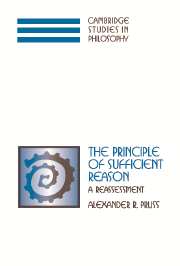Book contents
- Frontmatter
- Contents
- Acknowledgments
- Part I The Principle of Sufficient Reason and the Causal Principle
- Part II Objections to the PSR
- Part III Justifications of the PSR
- 11 Self-Evidence
- 12 Three Thomistic Arguments
- 13 Modal Arguments
- 14 Is the Universe Reasonable?
- 15 Explanation of Negative States of Affairs
- 16 The Puzzle of the Everyday Applicability of the PSR
- 17 Inference to the Best or Only Explanation
- 18 Inductive Skepticism
- 19 The Nature of Possibility
- 20 Conclusions
- Bibliography
- Index
18 - Inductive Skepticism
Published online by Cambridge University Press: 27 July 2009
- Frontmatter
- Contents
- Acknowledgments
- Part I The Principle of Sufficient Reason and the Causal Principle
- Part II Objections to the PSR
- Part III Justifications of the PSR
- 11 Self-Evidence
- 12 Three Thomistic Arguments
- 13 Modal Arguments
- 14 Is the Universe Reasonable?
- 15 Explanation of Negative States of Affairs
- 16 The Puzzle of the Everyday Applicability of the PSR
- 17 Inference to the Best or Only Explanation
- 18 Inductive Skepticism
- 19 The Nature of Possibility
- 20 Conclusions
- Bibliography
- Index
Summary
The Humean inductive skeptic claims that I do not know whether a stone dropped tomorrow will fall. It is promising to try to answer the skeptic in an externalist way. The kernel of any such answer will be that my belief that the stone dropped tomorrow will fall constitutes knowledge because I have inductive grounds for this belief and in fact throughout time stones dropped fall. I will argue, however, that given an Aristotelian conception of laws, unless the PSR is in fact metaphysically necessary, this externalist answer does not work. This will yield an argument for the PSR from the premises:
(134) An Aristotelian conception of laws is correct.
(135) I know that a stone dropped tomorrow will fall.
(136) The only way (135) could be true is in light of an externalist account such as sketched previously and elaborated below.
An externalist epistemology needs to include the notion of a defeater. For instance, some might think that even if some data-input or inference is in fact reliable and even if knowledge of its reliability is not required for it to be knowledge-conferring, nonetheless if the agent falsely believes it to be unreliable then she does not obtain knowledge through it. The belief that one is gathering information unreliably is then a defeater for the relevant knowledge claims.
Consider another defeater. Suppose I tossed a fair coin ten times and by chance it always came up heads.
- Type
- Chapter
- Information
- The Principle of Sufficient ReasonA Reassessment, pp. 295 - 298Publisher: Cambridge University PressPrint publication year: 2006



